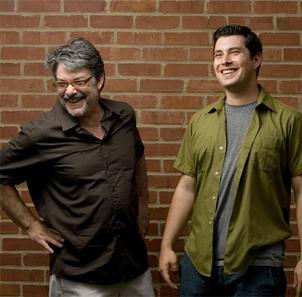We we're recently interviewed by Market Place Money's Chris Farrell for a piece he put together entitled "how to build a second act business with your millennial kid". The article touched on some interesting points and was featured on Time.com and Next Avenue.

“It’s awesome working with my dad,” says Case Bloom, 30. The feeling is mutual, says his father, David, 58: “We are good complements to one another.”
From ‘You’ to ‘We’
The Blooms, and their business manufacturing highly-crafted messenger bags targeted at the DJ market, are a prime example. Before opening shop, David had spent his career in bag design and was director of travel products for Coach in New York City before he lost that job. When Case was in college in Nashville, studying business, he’d offer pointers to help his dad’s venture. “His logo was so bad. Horrible,” laughs Case. “I’d tell him, ‘You’re doing it wrong. Do it like this.’”
Eventually, Case says, it became “We should do it this way. The business happened organically.” Today, father and son each own half of the company, which has seven employees. David handles design and product development; Case is in charge of anything to do with the brand image and online sales. He’s also the one making frequent runs to Home Depot for the business’s factory and to the Post Office for shipments. “I have a different set of skills than my father,” says Case, who is also a part-time DJ.
When Kinship Is Friendship
One reason for the growing second-act-plus-child trend: surveys repeatedly show that today’s young adults generally get along well with their parents—and vice versa. “The key is an attitudinal shift in the relations between generations,” says Steve King, founder of Emergent Research, a consulting firm focused on the small business economy. “Boomers are close to their kids and the kids are close to their parents.”
Take Amanda Bates, a Gen X’er, and her mother Kit Seay, co-owners of Tiny Pies in Austin, Texas. “We’ve always had a close relationship, feeding off one another, finishing each other’s sentences,” says Kit, 73. They’d long wanted to do something together.
Several years ago, Amanda got the idea for making handheld pies from her son’s desire to take pie to school. So she and her mother began selling small pies, based on family recipes, in local farmers markets. They now sell them throughout the state, mostly through specialty stores, and opened a retail storefront at their wholesale facility in March 2014. Kit focuses on the creative and catering side of the business; Amanda’s in charge of the basics of running an enterprise. “The trust is there,” says Kit. Amanda agrees. “Yes, the trust is there. If she says something will get done, it will.”
Teaching Your Child Trust
Trust and complementary skills are also themes for Lee Lipton, 59, and his son Max, 25, and their Benny’s On the Beachrestaurant in Lake Worth, Fla.
Lee, the restaurant’s principal owner, came out of the clothing manufacturing business, moving to Florida after the Calvin Klein outerwear line he ran with a few partners was sold. He bought Benny’s a year ago. Max, who’d wanted to get into the food business, is one partner; the other is chef Jeremy Hanlon. Lee’s the deal maker, Max manages the restaurant and executive chef Hanlon handles the kitchen. “The three of us trust each other incredibly and when one person feels strongly about something we tend to do it that way,” Lee says. “Very rarely after talking do we disagree, and that format was identical to my past partners. I want to teach Max and Jeremy that closeness.”
For second-act family businesses, creating boundaries between work and home is advisable, but easier to say than do. Speaking about her current relationship with her mom, Amanda Bates says: “We used to go out together and have fun, go to garage sales, that kind of thing. Now, when we get together, the business always come up. Even at family dinners, we end up talking business.”
The Win-Win of Multigenerational Businesses
But in the end, it’s family that makes these businesses succeed.
Bianca Alicea, 26, and her mom Alana, 46, started tchotchke-maker Chubby Chico Charms. in North Providence, R.I. with $500 and less than 100 charm designs at their dining room table in 2005. They now have roughly 25 full-time employees and sell several thousand handmade charms. Alana is the designer; Bianca deals more with payroll and other aspects of the business. “It’s important to remember you are family,” says Bianca. “Things don’t always go according to plan, but at the end of the day you have to see one another as family.”
Intergenerational entrepreneurship, it turns out, can be a win-win for boomers and their kids. For the parents, it’s the answer to the question: What will I do in my Unretirement? For their adult children, working with mom and dad provides them with greater meaning than just picking up a paycheck.
Chris Farrell is senior economics contributor for American Public Media’s Marketplace and author of the new bookUnretirement: How Baby Boomers Are Changing the Way We Think About Work, Community, and The Good Life. He writes twice a month about the personal finance and entrepreneurial start-up implications of Unretirement, and the lessons people learn as they search for meaning and income. Send your queries to him at cfarrell@mpr.org or @cfarrellecon on Twitter.
Record Bags
Record bags made for DJs or record buying folks. DJ Backpacks and messenger bags meant for holding 7” records, 45's, LPs, 12" singles, and virtually any other vinyl record format you can think of.
DJs require a specific type of bag, and that’s why we make our bags to the specifications and needs of working class DJs. Large enough to hold all types of vinyl, and padded enough to provide peace of mind that your precious LPs will make it from one gig to the next, without a scratch. From our larger 45 bag, made to hold a large assortment of records, to our dj backpacks and dj messenger bags, that are able to hold records and other necessary items, like cables, and laptops, we’ve got all the needs of a working class DJ covered.









